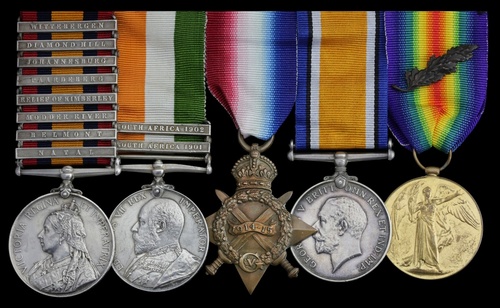
Auction: 18003 - Orders, Decorations and Medals
Lot: 331
(x) Five: Staff Captain D. S. Manners, Auckland Mounted Rifles, N.Z.E.F., late 9th Lancers, who saw extensive action in the Boer War and Great War, not least at Gallipoli, where in August 1915 his regiment was 'cut down to mere handfuls of sick and exhausted men; the month of fate that was to see all the sacrifice of lives, all the imperishable valour, all the striving of naked quivering souls, reap nothing but fame'
Queen's South Africa 1899-1902, 8 clasps, Natal, Belmont, Modder River, Relief of Kimberley, Paardeberg, Johannesburg, Diamond Hill, Witterbergen (3932 Serjt. D. Manners. 9/Lcrs.); King's South Africa 1901-02, 2 clasps, South Africa 1901, South Africa 1902 (3932 Serjt: D. Manners. 9th Lancers.); 1914-15 Star (13/631 Capt. D. Manners, N.Z.E.F.); British War and Victory Medals, M.I.D. oak leaf (13/631 Capt. D. Manners N.Z.E.F.), the last with officially re-impressed naming, light contact marks, generally very fine (5)
Douglas Stratford Manners was born at Kingston, Surrey on 23 March 1876, the son of Douglas Ernest Manners of County Limerick, Ireland, and his wife Ellen Johnson, of Richmond. Educated at St. John's College, Essex, he followed in his father's footsteps and became a professional soldier, serving 12 years in the ranks with the 9th Lancers.
The Lancers were despatched from India to South Africa in September 1899. Landing at Cape Town, their first role involved patrol work as mounted men were scarce in the Colony. On 9 January 1900 the Regiment took part in a raid into the Orange Free State. When the march to Kimberley commenced on 11 February, the 9th and 16th formed the 3rd Cavalry Brigade under Brigadier-General J. R. P. Gordon; in the rush through the Boer position on the morning of 15 February, the 9th and 16th headed the charge and did very well. At Diamond Hill, the cavalry was posted on the right flank and thrown back by strongly posted forces of the enemy; losses were considerable, but thereafter, the 3rd Cavalry took part in the initial steps of the movement which led to Prinsloo's surrender.
In early 1901 the Lancers were sent into Cape Colony to pursue the Boers who had crossed the Orange. Again and again they surprised laagers and killed or captured many of the enemy. They were specially praised for the capture of Letter's Commando on 5 September 1901, Lord Kitchener describing it as 'a brilliant success', despite losses to the 9th Lancers of 7 killed and 5 wounded; hostilities at an end, the Regiment returned to India in March 1902, and Douglas departed the Army for a new life in new Zealand.
Following the outbreak of the Great War, he enlisted in the Auckland Mounted Rifles in September 1914 and was appointed R.S.M. Embarked for the Dardanelles in early May 1915, his unit was pressed into the desperate fighting retreat from Chunuk Bair, as described in The Story of Two Campaigns: Official War History of the Auckland Mounted Rifles Regiment, 1914-1919:
'Line after line came over the crest, to be mown down by the naval and artillery guns, and particularly by the 10 machine-guns of the New Zealanders. Twenty-two lines of Turks came over the crest but to die.
While this tragedy was being enacted, the A.M.R. was resting in the vicinity of No. 2 Outpost. Its total strength was 66, this including sick men, who had not been in the advance. Of the 288 officers and men who went into the advance only 22 remained: Captain H. Smith, Regimental Q.M., Captain McCormick, medical officer, Lieutenants Herrold, McGregor and Cobourne, R.S.M. Manners, Sergeant Allsop and 15 rank and file. Worn out as they had been before the fighting, the survivors were now practically shadows of men.
Apart from sheer exhaustion, many of them were suffering from septic sores on their hands caused by the thorns of the scrub through which they had to force their way. The sense of tragedy was very near to them'.
On 24 August 1915, Douglas was transferred to the ambulance carrier Nile and thence to hospital in Alexandria, suffering from malaria. A month later he returned to Anzac Cove and was promoted 2nd Lieutenant on 21 October 1915, but the campaign was lost and he left the peninsula and returned to Egypt aboard the Hororata on 27 December. He remained in Egypt for the rest of the war, carrying out the duties of Adjutant to the N.Z.M.R. Brigade in 1917, and was promoted to Staff Captain in 1918; he was mentioned in despatches by General Sir E. H. H. Allenby (London Gazette 5 March 1919, refers).
Douglas was embarked for New Zealand aboard the Adoph Woermann in August 1919 and was discharged at the year's end. He died in Broome, Western Australia, on 19 December 1924; sold with copied service records and further research.
Subject to 5% tax on Hammer Price in addition to 20% VAT on Buyer’s Premium. For more information please view Terms and Conditions for Buyers.
Sold for
£800




